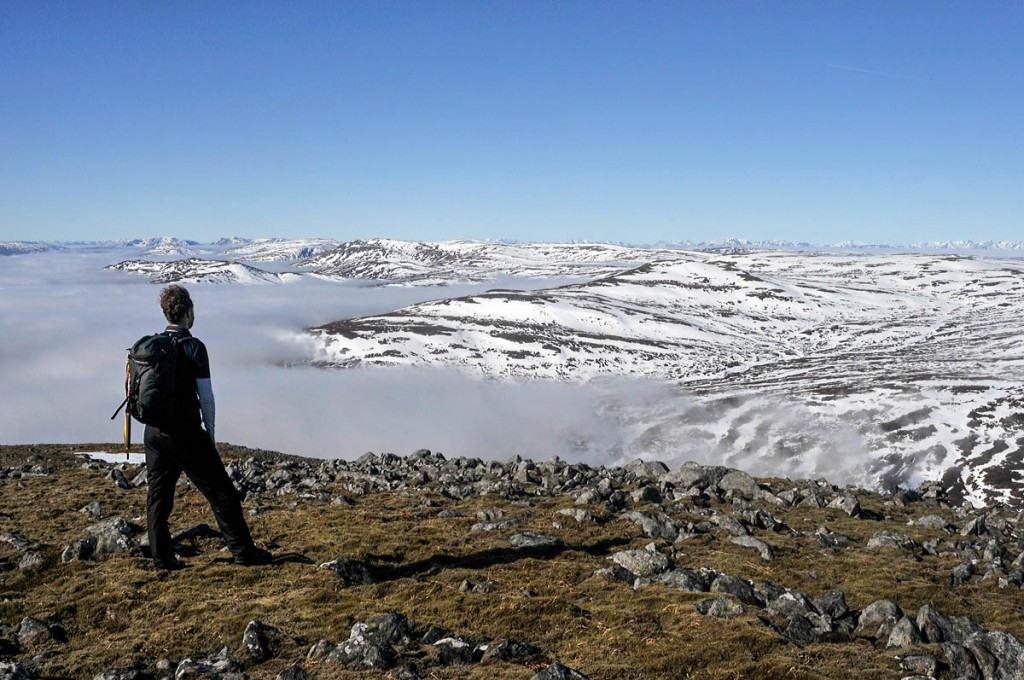Scotland’s mountaineering body has pledged financial support to a charity after it lost a potentially expensive legal battle over a proposed windfarm in the Highlands.
Mountaineering Scotland – formerly the Mountaineering Council of Scotland – will give £5,000 of its members’ money to the John Muir Trust, which faces a substantial bill for its action over the Stronelairg plans.
The Inner House of the Court of Session upheld an appeal by Scottish Ministers and Scottish & Southern Energy against the judicial review ruling late last year that halted the Stronelairg windfarm in the Monadhliath Mountains.
JMT chief executive Stuart Brooks said: “The decision contradicts the earlier ruling by the late Lord Jones, who in December 2015 ‘reduced’ the decision by Scottish ministers to consent the scheme.
“He ruled that members of the public had been denied the opportunity to comment on the revised planning application and that Scottish ministers failed to give adequate reasons for their decision when [Scottish Natural Heritage] was opposed in principle to any windfarm on the Stronelairg site because it could not be mitigated.
“Crucially, he stated that the trust was taking the action for the public good.
“The trust is naturally disappointed that his ruling has been overturned by an appeal court. We did not take this legal action lightly. If it goes ahead, this development would be the largest ever in the Scottish Highlands, with 67 turbines – substantially taller than the highest structures in any Scottish city – spread over an area of 35 sq km, comparable to the size of Inverness.
“It would involve the excavation of 22 million cubic feet of stone – equivalent to a Berlin wall stretching from the Pentland Firth to the English Channel – from an area consisting mainly of peatland, a massive carbon store and Scotland’s miniature version of the rainforest.
“The decision to approve the scheme flew in the face of expert advice from the government’s own advisory body SNH, which stated that the development would destroy the character of one of Scotland’s key areas of wild land.
“The application was also opposed by the Cairngorms National Park Authority, the Mountaineering Council of Scotland and three out of four local councillors, while written objections from the public outnumbered letters of support by 15 to one.”
Mr Brooks said there was no opportunity for thorough public scrutiny of the proposal because there was no objection from the relevant Highland Council planning committee, and therefore no requirement for a public local inquiry. “We believe that decision was based on flawed advice from planning officials,” he said.
The trust’s chief executive said it knew the odds were stacked against it. The vast majority of judicial review applications are rejected.
“We were also aware that this was a complex case whose outcome would be based on subjective interpretation by individual judges of the legality of the planning process.
“Notwithstanding this decision, we believe that by taking out this judicial review we have shown the determination of the trust to defend and protect wild land.”
He pointed out that, since the start of the trust’s legal action in August 2014, the Scottish Government has refused a number of major windfarm applications in and around wild land areas, including Allt Duine, Glencassley, Sallachy, Limekiln, Carn Gorm and Talladh a Bheithe in Rannoch, while Highland Council has also objected to several such developments.
“We believe the high profile legal case over Stronelairg and the public support it has generated may have influenced some or all of these decisions.
“Combined with changes to the UK onshore wind subsidy regime – which mean that capital-intensive projects such as Stronelairg are no longer as lucrative for energy companies and landowners – these precedents mean we are in a more favourable position today than we were when we first embarked on this course of action.
“We believe the action has strengthened the John Muir Trust’s reputation as a campaigning charity prepared to stand up strongly for what it believes in.
“Fighting this battle has consumed a significant amount of time and money. We are profoundly grateful for the generosity of all those who have donated to the Stronelairg appeal to date, and to those who have pledged further support. We could not have come this far without the backing of our members and supporters.
“After considering all the options, including initiating an appeal to the UK Supreme Court, we have come to the conclusion that we have reached the end of the road with our legal action.
“At each stage in the process, the courts refused applications from the trust for protected expenses orders, which would limit our financial liability. There is a good chance that we will need to appeal for more funds once the court has awarded costs.
“We believe that the planning regime in Scotland remains weighted in favour of developers with huge financial resources at their disposal, and we are now working with others to campaign for a level playing field, calling for an equal rights of appeal, that would allow charities and communities the same rights as developers and landowners.”
David Gibson, chief executive of Mountaineering Scotland, said: “Regardless of the fine points of the law, once again the winner is big business in the form of SSE.
“The real loser is Scotland’s wild land as this development, which has a footprint the size of Inverness, will cause massive environmental and visual damage to a much loved area.”
Stuart Brooks, said: “The offer of £5,000 is extremely welcome. The final costs of the Stronelairg campaign will not be known for a few months, once the opposition have declared their final costs and the courts have decided the final liability to the trust.
“While we cannot be sure, there is a strong likelihood that at that time we will need to appeal widely for further support.”
Helen McDade, head of policy with JMT, said: “It’s incredibly heartening the support people are showing but Mountaineering Scotland have been real stalwarts and partners on this.”
SSE said after the ruling: “Stronelairg is a carefully designed project with the carbon payback estimated to be around 16 months.
“It was strongly supported by many local stakeholders, was not opposed by the local community council and was supported by the Highland Council planning committee. The ruling has brought good news to a project that would bring significant benefits to the local and wider economy.”

